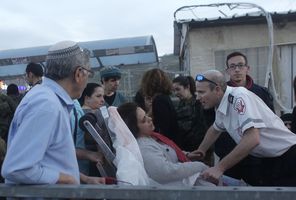HEBRON, West Bank — Amer Salah was sleeping last May when Israeli forces entered the 14-year-old's bedroom in the middle of the night.
He said he was arrested for throwing stones at vehicles of neighboring Jewish settlers, which he denied, and was jailed with nine other kids in a cell barely 6-feet by 6-feet without fresh air or ample light. “We were not even allowed to see the sun,” he said.
Salah, who was released after 10 days in detention in that crowded cell, is one of hundreds of Palestinian youths under the age of 18 who have been jailed for participating in attacks on Israeli Jews.
The arrests have multiplied since a spate of stabbings and other assaults last fall over Israel's continued occupation of the West Bank. On ThursdayFeb. 18, two 14-year-old Palestinian boys stabbed an Israeli soldier to death and wounded a second Israeli man at a supermarket in a Jewish settlement south of Ramallah. Both teens were wounded by armed bystanders.
Currently, Israel is holding 420 Palestinians under the age of 18 for alleged attacks in East Jerusalem and the West Bank, according to Israeli Prison Service statistics. The figures show that the number of imprisoned youths, who are kept separately from adults, increased by more than 60% since violence erupted in October.
The youngest is 11-year-old Ali Alqam, who is charged with wounding a security guard in an October knife attack at a Jerusalem light rail station. Four other prisoners are 12 or 13, according to the prison service.
Palestinian minors convicted of throwing stones at military vehicles, the most common charge, generally receive prison terms of two to six months for first offenses. If an Israeli suffers injuries, they can get sentences of up to 15 years in jail.
Under Israeli law, Palestinian youths can be held in pre-trial detention for one year, although army officers who serve as judges can extend those periods. Most spend around six months in detention awaiting trial, said Gerard Horton, an Australian lawyer with the Ramallah-based Military Court Watch, which monitors the legal system ;that Israel operates in the West Bank.
By contrast, Israeli minors ages 14 and older, including those living in West Bank settlements, cannot be held in pre-trial detention for more than six months.
Horton accuses Israeli authorities of mistreating the Palestinian youths. “Under international law and norms, children should only be deprived of their liberty as a measure of last resort and for the shortest appropriate period of time,” he said.
Figures released by the Israeli court system after a Freedom of Information request by Military Court Watch show that bail is denied to 70% of Palestinian youths who are detained.
“That number is a reverse of what happens with Israeli minors who are in front of the civil court system, where the vast majority are released on bail,” said Tel Aviv civil rights lawyer Nery Ramati, an Israeli. “With young Israeli offenders there are many rehabilitation and probation options, but for the Palestinian minors there are almost none.”
Since early October, Palestinians have stabbed Israeli civilians and soldiers 199 times, shot at them 41 times and rammed their vehicles into pedestrians 23 times, according to the Israel Defense Forces.
Defense Forces.
Israel’s internal security agency, the Shin Bet, released figures showing that 11% of the violent incidents involved assailants younger than 16.
Those numbers illustrate how Israeli authorities have little recourse but to put kids behind bars, said Anat Berko, a member of Israel’s parliament who has a doctorate in criminology.
“I wish we did not have to put Palestinian minors under 14 in prison, and we are working on programs with the Palestinian Authority to put offenders under 14 under their supervision in Ramallah,” said Berko, a member of the ruling Likud Party. “But there is peer pressure to participate in this violence, and Palestinian leaders need to make it clear that this is not the right way for their youth to achieve a solution to the conflict.”
Human rights activists counter that the young Palestinians' rights are being violated. “No one is denying that there is a wave of knife attacks and stone throwing, much it conducted by Palestinian youths,” said Sarit Michaeli, a spokeswoman for B’tselem — the Israeli Information Center for Human Rights in the Occupied Territories. “But even when involved in serious offenses, a child offender is still a child, and the authorities who are entitled to charge and prosecute them still should not violate the rights of children.”
Israeli authorities often arrest suspects during nighttime raids, submit them to rough interrogations without legal representation and transfer them from Palestinian territory to Israel, where the detainees’ families can’t easily travel, Michaeli said.
A recent United Nations Children's Fund (UNICEF) report backed up those claims, saying the ill-treatment of Palestinian children in the Israeli military detention system appears to be widespread, systematic and institutionalized.
Israel Prisons Service spokeswoman Sivan Weitzman said her nation’s incarceration conditions for minors meet international standards.
“Of course growing teenagers receive more nutrition than the adult detainees, and the exercise areas in our prison are open-air with a wire mesh covering to prevent drones from dropping drugs and other contraband into the courtyard,” Weitzman said.
“Young Palestinian detainees in our prisons get the same conditions as Jewish prisoners,” said Weitzman, who added that the two groups are separated from one another.
Salah, the accused rock thrower, said he was terrified when Israeli forces interrogated him: “They insulted me using verbal abuse and beat me.”
Israeli military and prison officials declined to comment on Salah’s case.


